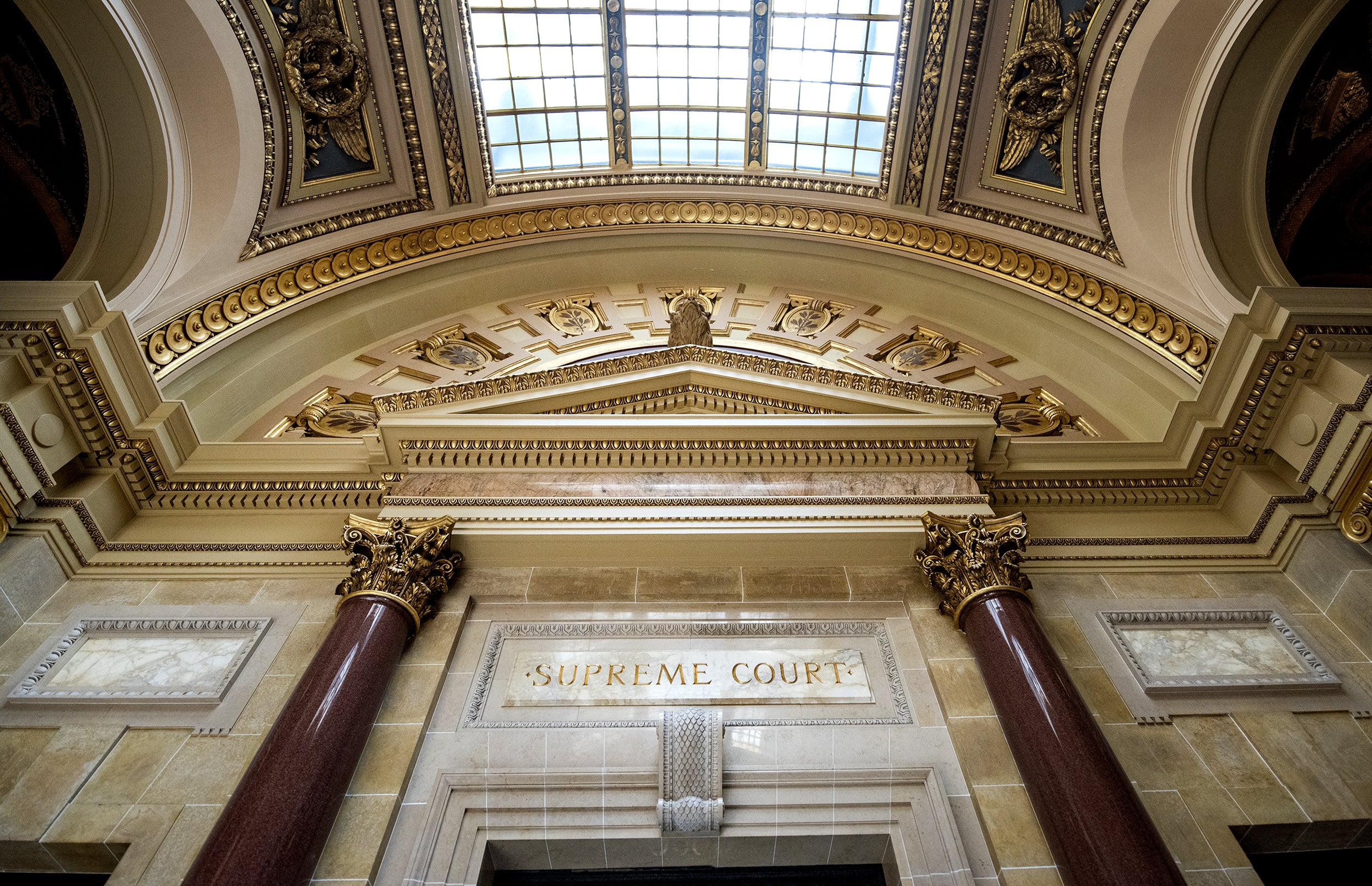A former regulator’s relationships with employees of utilities building the Cardinal-Hickory Creek transmission line didn’t create a serious risk of bias when the Public Service Commission unanimously approved the project, the state Supreme Court ruled on Thursday.
In a 4-3 ruling, the court’s conservative majority undermined a lawsuit challenging the commission’s approval of the project in 2019. The Driftless Area Land Conservancy, Wisconsin Wildlife Federation and local governments filed that challenge to block construction of the more than $500 million transmission line across southwestern Wisconsin. The line is being built by American Transmission Company, ITC Midwest and Dairyland Power Cooperative.
Conservation groups claimed PSC Chair Rebecca Valcq and Commissioner Mike Huebsch should have recused themselves from the case because of their ties to supporters of the project. They pointed to Huebsch’s participation on an advisory board for the Midcontinent Independent System Operator, which is the regional grid operator that supports the project. Groups also highlighted Huebsch’s application for a top job with Dairyland Power soon after leaving the commission. Huebsch didn’t land the position.
News with a little more humanity
WPR’s “Wisconsin Today” newsletter keeps you connected to the state you love without feeling overwhelmed. No paywall. No agenda. No corporate filter.
The project’s opponents had issued a subpoena to inspect Huebsch’s cellphone after discovery of encrypted messages with utility employees while the case was pending before the commission.
The former commissioner and lawmaker moved to quash the subpoena, but a lower court rejected that motion. Huebsch appealed and asked the court to put a hold on its ruling while the appeal was pending. But groups later dropped their request to inspect Huebsch’s phone and issued a new subpoena that demanded he testify in court.
The Supreme Court ruled that Huebsch didn’t have to testify or turn over his phone, and conservative justices said there was no serious risk of bias that would have violated opponents’ rights to due process when the commission approved the project.
Justice Patience Roggensack wrote the majority opinion reversing a ruling from the Circuit Court for Dane County.
“We further conclude that the circuit court did not clearly apply the correct legal standard when evaluating whether a due process violation had been stated,” Roggensack wrote. “And we conclude the circuit court erroneously denied Huebsch’s request for a stay pending appeal. Accordingly, we reverse the circuit court.”
Huebsch’s attorney Ryan Walsh called the high court’s decision a “resounding victory.”
“The ruling sends a clear signal to this judge and other judges that there shouldn’t be fact-finding into the personal lives of judges and judicators without rock-solid evidence that something inappropriate has happened,” Walsh told Wisconsin Public Radio.
“For years he has been under a cloud because of suggestions that he behaved inappropriately — somehow unethically — but all along nobody’s had any proof of anything,” Walsh said. “It’s ridiculous because he’s been a public servant for many, many decades and he takes his obligations to the public very seriously.”
Dane County Judge Jacob Frost had previously ruled opponents could gather evidence on whether Huebsch acted impartially, saying the appearance of bias would be enough to taint the commission’s review and revoke the line’s permit. The state Supreme Court overturned the judge’s use of that standard.
Huebsch’s attorney and the Public Service Commission had argued the group’s allegations were based on speculation, accusing the project’s opponents of mounting a fishing expedition to uncover evidence in support of their theory.
Walsh had argued, and conservative justices agreed, his client and other decision-makers enjoy a presumption of impartiality and honesty that protect them from “baseless discovery and fact finding.” Walsh had noted Huebsch wasn’t barred from talking to those who appeared before the commission as long as no improper ex parte communications took place.
PSC spokesperson Matt Sweeney told WPR that integrity is core to its mission.
“Today’s decision reaffirms that integrity remains strongly in place and helps protect public servants against frivolous, unfair, and unfounded claims of bias,” Sweeney wrote in a statement.
Liberal justices had opposed the court hearing the case. They said Huebsch’s petition for the court to review the case should have been first challenged in lower courts.
Howard Learner, executive director of the Environmental Law & Policy Center, is the attorney representing Driftless Area Land Conservancy and the Wisconsin Wildlife Federation. He called the decision disappointing.
“Allowing these kinds of improper communications without any recourse under state law undermines public confidence in the fairness and integrity of Wisconsin’s utility regulatory process,” he wrote in a statement. “We agree with the three justices in dissent that the Supreme Court majority stretched to reach issues that were not properly before the Court, provided ‘special treatment’ to Commissioner Huebsch, and that the decision will only ‘deepen inequalities in our system of justice.’”
Thursday’s ruling specifically looked at allegations of bias against Huebsch. The ruling did not address the merits of the PSC’s approval of the Cardinal-Hickory Creek transmission line project.
The project’s co-owners issued a statement Thursday, thanking the court for “putting an end to the contrived ‘fishing expedition’.”
Construction of the 102-mile line from Dane County to Dubuque County, Iowa is ongoing. However, conservation groups have called on the commission, state environmental regulators and the courts to halt construction of the project after a federal judge blocked the line’s Mississippi River crossing as part of a separate lawsuit filed against federal agencies. Utilities have appealed that judge’s decision, and an appeals court panel is set to hear arguments in that case this fall.
Editor’s note: American Transmission Company is an underwriter of Wisconsin Public Radio.
Wisconsin Public Radio, © Copyright 2025, Board of Regents of the University of Wisconsin System and Wisconsin Educational Communications Board.





